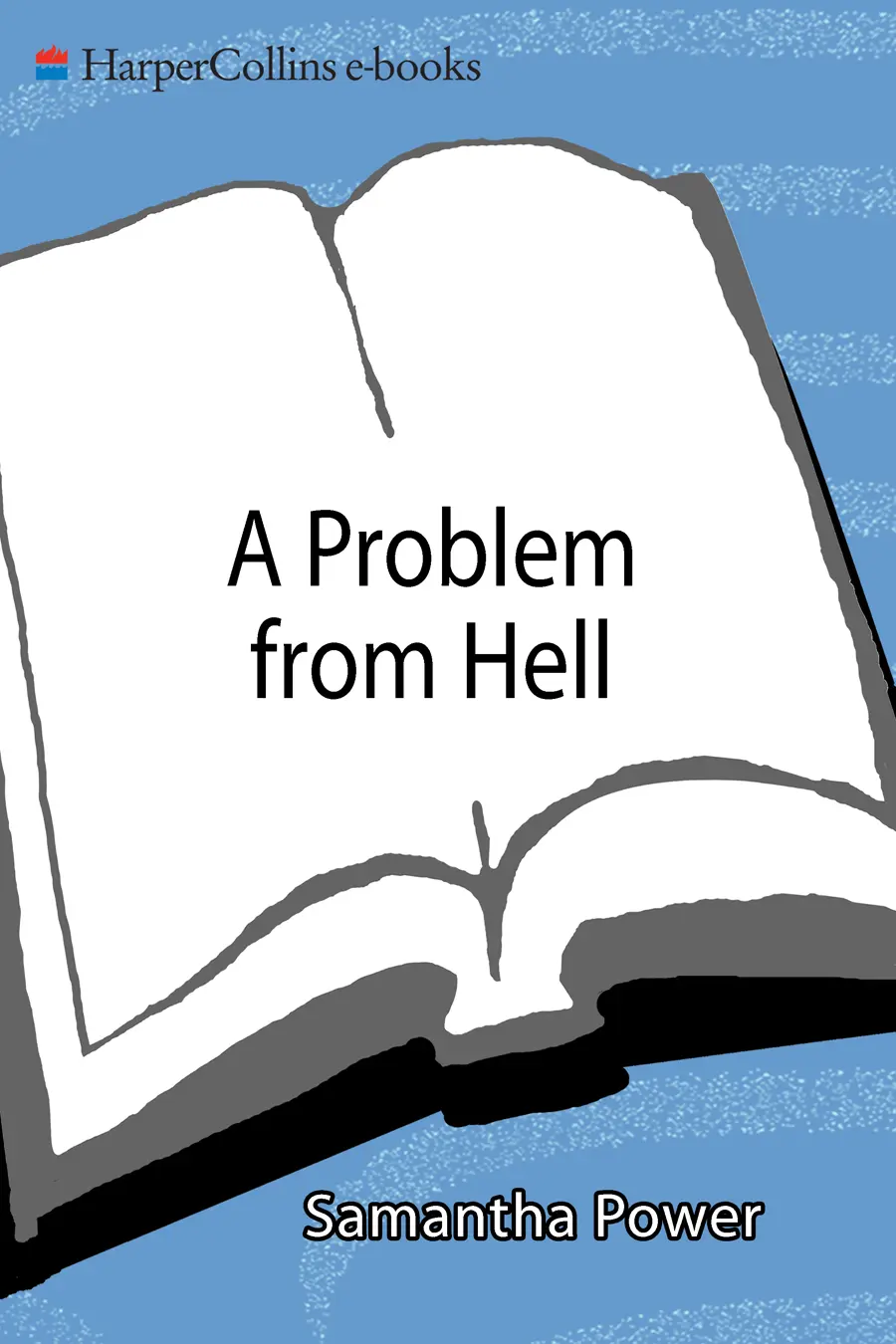
“A Problem from Hell”
America and the Age of Genocide
Samantha Power

Copyright
Harper Perennial
An imprint of HarperCollins Publishers Ltd 1 London Bridge Street London SE1 9GF
www.harperperennial.co.uk
This edition published by Harper Perennial 2007
FIRST EDITION
First published in Great Britain by Flamingo in 2003
First published in the US by Basic Books, a member of the Perseus Book Group
Copyright © Samantha Power 2003
PS Section copyright © HarperCollins Publishers 2007, except ‘The Void:Why the Movement Needs Help’and ‘“Why Can’t We” – A Commencement Address’ by Samantha Power © Samantha Power 2007
Samantha Power asserts the moral right to be identified as the author of this work
A catalogue record for this book is available from the British Library
All rights reserved under International and Pan-American Copyright Conventions. By payment of the required fees, you have been granted the non-exclusive, non-transferable right to access and read the text of this e-book on screen. No part of this text may be reproduced, transmitted, downloaded, decompiled, reverse engineered, or stored in or introduced into any information storage and retrieval system, in any form or by any means, whether electronic or mechanical, now known or hereinafter invented, without the express written permission of HarperCollins e-books.
This book is sold subject to the condition that it shall not, by way of trade or otherwise, be lent, re-sold, hired out or otherwise circulated without the publisher’s prior consent in any form of binding or cover other than that in which it is published and without a similar condition including this condition being imposed on the subsequent purchaser.
HarperCollins Publishers has made every reasonable effort to ensure that any picture content and written content in this ebook has been included or removed in accordance with the contractual and technological constraints in operation at the time of publication
Source ISBN: 9780007172993
Ebook Edition © MAY 2010 ISBN: 9780007346981
Version: 2019-01-15
Awards and Accolades
Winner of the Pulitzer Prize for General Non-fiction 2003
Winner of Robert F. Kennedy Book Award 2003
Winner of the National Book Critics Circle Award for General Non-fiction
Winner of the National Magazine Award for her Atlantic Monthly article “Bystanders to Genocide”
Winner of the Raphael Lemkin Award (Institute for the Study of Genocide)
Winner of the J. Anthony Lukas Book Prize for the Best Book on American Political or Social Concern That Exemplifies Literary Grace and Commitment to Serious Research
Short-listed for the Los Angeles Times Book Prize for the Best Book in Current Interest
Short-listed for the Arthur Ross Book Award for the Best Book in International Affairs (Council on Foreign Relations)
Short-listed for the Lionel Gelber Prize for the Best Book in International Relations (Munk Center for International Studies, Canada)
Winner of the National Magazine Award for her New Yorker article “Dying in Darfur”
Cover Page
Title Page
Copyright
Awards and Accolades
Chapter 1 “Race Murder”
Chapter 2 “A Crime Without a Name”
Chapter 3 The Crime With a Name
Chapter 4 Lemkin’s Law
Chapter 5 “A Most Lethal Pair of Foes”
Chapter 6 Cambodia: “Helpless Giant”
Chapter 7 Speaking Loudly and Looking for a Stick
Chapter 8 Iraq: “Human Rights and Chemical Weapons Use Aside”
Chapter 9 Bosnia: “No More than Witnesses at a Funeral”
Chapter 10 Rwanda: “Mostly in a Listening Mode”
Chapter 11 Srebrenica:“Getting Creamed”
Chapter 12 Kosovo: A Dog and a Fight
Chapter 13 Lemkin’s Courtroom Legacy
Chapter 14 Conclusion
Notes
Bibliography
Index
P.S.
About the author
Author Biography
About the book
A Conversation with Samantha Power
Read on
The Void: Why the Movement Needs Help
“Why Can’t We?” – A Commencement Address
Acknowledgments
About the Author
Praise
About the Publisher
Trial by Fire
On March 14, 1921, on a damp day in the Charlottenburg district of Berlin, a twenty-four-year-old Armenian crept up behind a man in a heavy gray overcoat swinging his cane. The Armenian, Soghomon Tehlirian, placed a revolver at the back of the man’s head and pulled the trigger, shouting, “This is to avenge the death of my family!” The burly target crumpled. If you had heard the shot and spotted the rage distorting the face of the young offender, you might have suspected that you were witnessing a murder to avenge a very different kind of crime. But back then you would not have known to call the crime in question “genocide.” The word did not yet exist.
Tehlirian, the Armenian assassin, was quickly tackled. As pedestrians beat him with their fists and house keys,he shouted in broken German, “I foreigner, he foreigner, this not hurt Germany…It’s nothing to do with you.” 1It was national justice carried out in an international setting. Tehlirian had just murdered Mehmed Talaat, the former Turkish interior minister who had set out to rid Turkey of its Armenian “problem.” In 1915 Talaat had presided over the killing by firing squad, bayoneting, bludgeoning, and starvation of nearly 1 million Armenians. 2
The outside world had known that the Armenians were at grave risk well before Talaat and the Young Turk leadership ordered their deportation. When Turkey entered World War I on the side of Germany against Britain, France, and Russia, Talaat made it clear that the empire would target its Christian subjects. In January 1915, in remarks reported by the New York Times, Talaat said that there was no room for Christians in Turkey and that their supporters should advise them to clear out. 3By late March Turkey had begun disarming Armenian men serving in the Ottoman army. On April 25, 1915, the day the Allies invaded Turkey, Talaat ordered the roundup and execution of some 250 leading Armenian intellectuals in Constantinople. In each of Turkey’s six eastern provinces, local Armenian notables met roughly the same fate. Armenian men in rural areas were initially enlisted as pack animals to transport Turkish supplies to the front, but soon even this was deemed too dignified an existence for the traitorous Christians. Churches were desecrated. Armenian schools were closed, and those teachers who refused to convert to Islam were killed. All over Anatolia the authorities posted deportation orders requiring the Armenians to relocate to camps prepared in the deserts of Syria. In fact, the Turkish authorities knew that no facilities had been prepared, and more than half of the deported Armenians died on the way. “By continuing the deportation of the orphans to their destinations during the intense cold,” Talaat wrote, “we are ensuring their eternal rest.” 4
“Official proclamations,” like this one from June 1915, cropped up around town:
Our Armenian fellow countrymen,…because…they have…attempted to destroy the peace and security of the Ottoman state,…have to be sent away to places which have been prepared in the interior…and a literal obedience to the following orders, in a categorical manner, is accordingly enjoined upon all Ottomans:
Читать дальше














